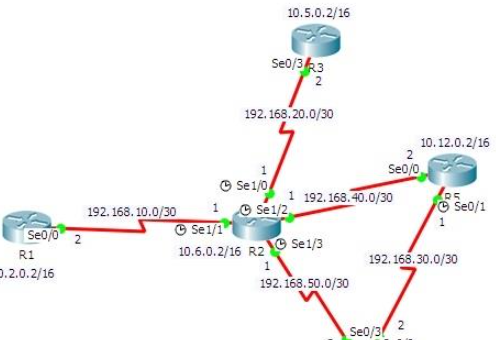如何分析EIGRP协议
时间:2023-05-20 00:44
1、EIGRP协议简述 EIGRP(Enhanced Inerior Gateway Routing Protocol,增强型内部网关路由协议)是一个平衡混合型路由协议,它融合了距离矢量和链路状态两种路由协议的优点,也是CISCO的私有协议。 EIGRP是一个高效的路由协议,它的特点是: 通过发送和接收Hello包来建立和维持邻居的关系,并交换路由信息; 采用组播(224.0.0.10)或单播进行路由更新; EIGRP的管理距离为90和170; 采用触发更新,减少带宽占用; 支持可变长子网掩码(VLSM),默认开启自动汇总功能; 支持IP、IPX、和Apple Talk等多种网络层协议; 对每一种网络协议,EIGRP多维持独立的邻居表、拓扑表和路由表; EIGRP采用Diffusing Upadte算法(DUAL)来实现快速收敛并确保没有路由环路; 存储整个网络拓扑结构的信息,一边快速适应网络变化; 支持等价和非等价的负载均衡; 使用可靠传输协议(RTP)保证路由信息传输的可靠性; 无缝连接数据链路层协议和拓扑结构,EIGRP不要求对OSI参考模型的2层协议进行配置; 2、实验目的 简单理解EIGRP以下二个基础知识点。 理解邻居表、拓扑表以及路由表; EIGRP度量值的计算方法; 3、拓扑图 两台相邻的路由器要建立起邻接关系需要满足两个条件,为相同的AS号和相匹配的K值。以R2为例,你可以使用“Show ip protocols”命令来查看 R2#show ip protocols Routing Protocol is "eigrp 200 " Outgoing update filter list for all interfaces is not set Incoming update filter list for all interfaces is not set Default networks flagged in outgoing updates Default networks accepted from incoming updates EIGRP metric weight K1=1, K2=0, K3=1, K4=0, K5=0 EIGRP maximum hopcount 100 EIGRP maximum metric variance 1 Redistributing: eigrp 200 Automatic network summarization is not in effect Maximum path: 4 Routing for Networks: 192.168.10.0 192.168.20.0 192.168.40.0 192.168.50.0 0.0.0.0 Routing Information Sources: Gateway Distance Last Update 192.168.10.2 90 330051 192.168.20.2 90 356798 192.168.40.2 90 382527 192.168.50.2 90 418109 Distance: internal 90 external 170 由于当前最大允许4条线路负载均衡,若路由器允许可继续增加线路,可用maximum-paths *来修改数量(*代表数量单位)。此外,可以注意到以红色字体标出的“eigrp 200”,它表示当前使用的EIGRP自主系统号为200 EIGRP metric weight K1=1, K2=0, K3=1, K4=0, K5=0则为K值,其含义如下: K1代表带宽 K2代表负载 K3代表延时 K4和K5代表可靠性 默认情况下EIGRP只使用了带宽和负载为度量值计算参数。若要修改K值可用metric weights tos k1 k2 k3 k4 k5命令,其中tos被用作服务质量区分服务等级,0为不启用,1为启用。 (1)、邻居表 R2#show ip eigrp neighbors IP-EIGRP neighbors for process 100 H Address Interface Hold Uptime SRTT RTO Q Seq (sec) (ms) Cnt Num 0 192.168.10.2 Se1/1 12 00:11:47 40 1000 0 78 1 192.168.20.2 Se1/0 12 00:11:20 40 1000 0 80 2 192.168.40.2 Se1/2 11 00:10:54 40 1000 0 91 3 192.168.50.2 Se1/3 14 00:10:19 40 1000 0 94 “H”表示邻居被学到的先后顺序,0是最先学到的邻居; “Address”是邻居路由接口IP; “Interface”是本地路由和这个邻居相连的接口; “Hold”是当前的保持时间,默认15秒,是一个递减的数值; “Uptime”是邻居进入邻居表到当前经过了多长时间; “SRTT”是指正常往返时间,它以毫秒计算报文在路由器间传送的平均往返时间的测量; “RTO”是指确定重传间隔值; “Q”是指队列计数,列是发送队列中等待报文数。此数值若高于0说明链路中有拥塞; (2)、路由表 R2#show ip route Codes: C - connected, S - static, I - IGRP, R - RIP, M - mobile, B - BGP D - EIGRP, EX - EIGRP external, O - OSPF, IA - OSPF inter area N1 - OSPF NSSA external type 1, N2 - OSPF NSSA external type 2 E1 - OSPF external type 1, E2 - OSPF external type 2, E - EGP i - IS-IS, L1 - IS-IS level-1, L2 - IS-IS level-2, ia - IS-IS inter area * - candidate default, U - per-user static route, o - ODR P - periodic downloaded static route Gateway of last resort is not set 10.0.0.0/16 is subnetted, 5 subnets D 10.2.0.0 [90/20640000] via 192.168.10.2, 00:13:00, Serial1/1 D 10.5.0.0 [90/20640000] via 192.168.20.2, 00:12:48, Serial1/0 C 10.6.0.0 is directly connected, Loopback0 D 10.11.0.0 [90/20640000] via 192.168.50.2, 00:12:23, Serial1/3 D 10.12.0.0 [90/20640000] via 192.168.40.2, 00:12:35, Serial1/2 192.168.10.0/30 is subnetted, 1 subnets C 192.168.10.0 is directly connected, Serial1/1 192.168.20.0/30 is subnetted, 1 subnets C 192.168.20.0 is directly connected, Serial1/0 192.168.30.0/30 is subnetted, 1 subnets D 192.168.30.0 [90/21024000] via 192.168.40.2, 00:12:35, Serial1/2 [90/21024000] via 192.168.50.2, 00:12:23, Serial1/3 192.168.40.0/30 is subnetted, 1 subnets C 192.168.40.0 is directly connected, Serial1/2 192.168.50.0/30 is subnetted, 1 subnets C 192.168.50.0 is directly connected, Serial1/3 路由表中若出现"D *.*.*.*/* is a summary, 00:15:00, Null0",是一条自动汇总产生的路由,EIGRP和RIP默认都在主网边界自动汇总,而不同的是EIGRP会在本地产生一条自动汇总后的路由,目标指向空接口(Null0)发往空接口的数据会被丢弃。每条链路都会有自动汇总记录,从而有效地避免路由环路的产生。不必使用自动汇总功能,可以通过取消no auto-summary来实现。 D 192.168.30.0 [90/21024000] via 192.168.40.2, 00:12:35, Serial1/2这是一条通过EIGRP学到的最终路由,D代表是通过EIGRP学到的,可以看到192.168.30.0/30这条链路是被汇总得来的,[90/21024000]中的90是EIGRP默认的管理距离,后面是度量值。可以通过R4或R5中的任何一个路由器到达192.168.30.0/30这条链路。 R2#show ip eigrp topology IP-EIGRP Topology Table for AS 200 Codes: P - Passive, A - Active, U - Update, Q - Query, R - Reply, r - Reply status P 10.2.0.0/16, 1 successors, FD is 20640000 via 192.168.10.2 (20640000/128256), Serial1/1 P 10.5.0.0/16, 1 successors, FD is 20640000 via 192.168.20.2 (20640000/128256), Serial1/0 P 10.6.0.0/16, 1 successors, FD is 128256 via Connected, Loopback0 P 10.11.0.0/16, 1 successors, FD is 20640000 via 192.168.50.2 (20640000/128256), Serial1/3 via 192.168.40.2 (21152000/2297856), Serial1/2 P 10.12.0.0/16, 1 successors, FD is 20640000 via 192.168.40.2 (20640000/128256), Serial1/2 via 192.168.50.2 (21152000/2297856), Serial1/3 P 192.168.10.0/30, 1 successors, FD is 20512000 via Connected, Serial1/1 P 192.168.20.0/30, 1 successors, FD is 20512000 via Connected, Serial1/0 P 192.168.30.0/30, 2 successors, FD is 21024000 via 192.168.40.2 (21024000/2169856), Serial1/2 via 192.168.50.2 (21024000/2169856), Serial1/3 P 192.168.40.0/30, 1 successors, FD is 20512000 via Connected, Serial1/2 P 192.168.50.0/30, 1 successors, FD is 20512000 via Connected, Serial1/3 其中P表示被动路由,即路由是稳定可用的。 Successors是到达远程网络的主要路由,对任何特定的路由可以有多达标4条后继路由。 例如:192.168.10.0/30, 1 successors,为去往192.168.10.0/30的最佳路径,FD为可行距离。 (4)、EIGRP度量值的计算方法 EIGRP通过组合带宽、延迟、可靠性和负载等因素的复合度量值计算到目的地址的最佳路径。如果K1、K2、K3、K4、K5都不为0,则可使用以下公式计算复合度量值: Metric=[K1*Bandwidth+(K2*Bandwidth)/(256-Load)+K3*Delay]*[K5/(Reliability+K4)] 其中K1影响的是带宽(Bandwidth),K2影响的是负载(Load),K3影响的是延时(Delay),K4和K5影响的是可靠性(Reliability); 一般情况下Cisco路由器只使用K1和K3来进行复合度量值的计算,所以公式同样可以使用如下公式: 重写后的句子:The metric is calculated as 256 times the sum of (10000M divided by the minimum link bandwidth between the source and destination, plus the sum of all link delays between the source and destination divided by 10). 其中源和目的之间最低链路带宽,单位是M;源和目的之间所有链路延时总和,单位是微秒(usec);那么为什么我要用延时总和除以10,那是因为EIGRP度量值计算中是使用10微秒作为单位进行计算的。 下面我们看看实验,例如要计算R2到R1的loopback0接口的复合度量值,怎么计算? 首先我们要注意R2到R1的loopback0接口的度量值,要使用R2向R1的loopback0接口方向的出接口的带宽和延时作为参数来计算: R2#show int se1/1 Serial1/1 is up, line protocol is up (connected) Hardware is HD64570 Internet address is 192.168.10.1/30 MTU 1500 bytes, BW 128 Kbit, DLY 20000 usec, 如上可以查看到R2的Serial 1/1接口参数为BW带宽等0.128M,延时为20000微秒。 R1#show int loopback0 Loopback0 is up, line protocol is up (connected) Hardware is Loopback Internet address is 10.2.0.2/16 MTU 1514 bytes, BW 8000000 Kbit, DLY 5000 usec, 如上为R1的loopback0接口的参数,其带宽为8000M,延时为5000微秒。 那么我来根据公式“重写后的句子:The metric is calculated as 256 times the sum of (10000M divided by the minimum link bandwidth between the source and destination, plus the sum of all link delays between the source and destination divided by 10).”,如果R2的Serial1/1去往R1的loopback0接口,最低链路带宽是0.128M,延时总和是Serial1/1的延时+R1的loopback0接口的延时=20000+5000,把它代入公式计算: [10000/R2的serial1/1接口带宽(单位M)+(R2的serial1/1接口延时+R1的loopback0接口延时)/10]*256 即[10000/0.128+(20000+5000)/10]*256 [78125+2500]*256=20640000 下面我们来验证一下,R2去往R1的loopback0端口 R2#show ip eigrp topology IP-EIGRP Topology Table for AS 200 Codes: P - Passive, A - Active, U - Update, Q - Query, R - Reply, r - Reply status P 10.2.0.0/16, 1 successors, FD is 20640000 via 192.168.10.2 (20640000/128256), Serial1/1 P 10.5.0.0/16, 1 successors, FD is 20640000 via 192.168.20.2 (20640000/128256), Serial1/0 P 10.6.0.0/16, 1 successors, FD is 128256 via Connected, Loopback0 P 10.11.0.0/16, 1 successors, FD is 20640000 via 192.168.50.2 (20640000/128256), Serial1/3 via 192.168.40.2 (21152000/2297856), Serial1/2 P 10.12.0.0/16, 1 successors, FD is 20640000 via 192.168.40.2 (20640000/128256), Serial1/2 via 192.168.50.2 (21152000/2297856), Serial1/3 P 192.168.10.0/30, 1 successors, FD is 20512000 via Connected, Serial1/1 P 192.168.20.0/30, 1 successors, FD is 20512000 via Connected, Serial1/0 P 192.168.30.0/30, 2 successors, FD is 21024000 via 192.168.40.2 (21024000/2169856), Serial1/2 via 192.168.50.2 (21024000/2169856), Serial1/3 P 192.168.40.0/30, 1 successors, FD is 20512000 via Connected, Serial1/2 P 192.168.50.0/30, 1 successors, FD is 20512000 via Connected, Serial1/3 以上就是如何分析EIGRP协议的详细内容,更多请关注Gxl网其它相关文章!
(3)、拓扑表



























